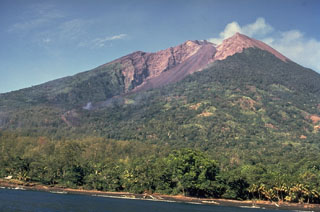Report on Manam (Papua New Guinea) — 20 October-26 October 2010
Smithsonian Institution / US Geological Survey
Weekly Volcanic Activity Report, 20 October-26 October 2010
Managing Editor: Sally Sennert.
Please cite this report as:
Global Volcanism Program, 2010. Report on Manam (Papua New Guinea) (Sennert, S, ed.). Weekly Volcanic Activity Report, 20 October-26 October 2010. Smithsonian Institution and US Geological Survey.
Manam
Papua New Guinea
4.08°S, 145.037°E; summit elev. 1807 m
All times are local (unless otherwise noted)
Based on analysis of satellite imagery, the Darwin VAAC reported that on 22 October an ash plume from Manam rose to an altitude of 4.3 km (14,000 ft) a.s.l. and drifted 130 km NW. A subsequent notice stated that the ash plume had dissipated.
Geological Summary. The 10-km-wide island of Manam, lying 13 km off the northern coast of mainland Papua New Guinea, is one of the country's most active volcanoes. Four large radial valleys extend from the unvegetated summit of the conical basaltic-andesitic stratovolcano to its lower flanks. These valleys channel lava flows and pyroclastic avalanches that have sometimes reached the coast. Five small satellitic centers are located near the island's shoreline on the northern, southern, and western sides. Two summit craters are present; both are active, although most observed eruptions have originated from the southern crater, concentrating eruptive products during much of the past century into the SE valley. Frequent eruptions, typically of mild-to-moderate scale, have been recorded since 1616. Occasional larger eruptions have produced pyroclastic flows and lava flows that reached flat-lying coastal areas and entered the sea, sometimes impacting populated areas.

